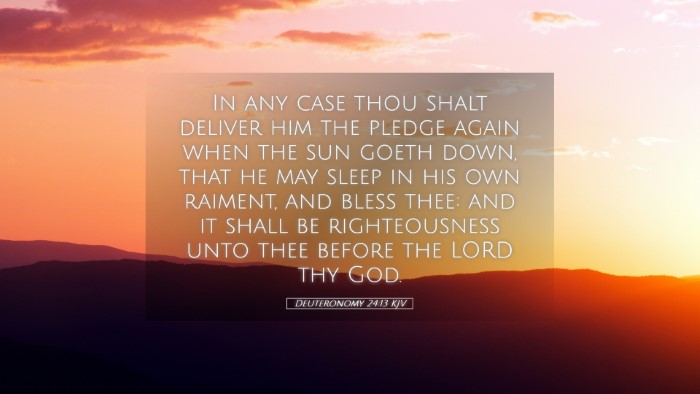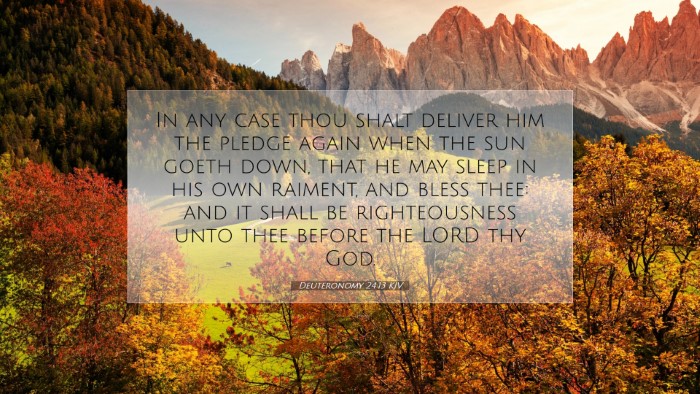Commentary on Deuteronomy 24:13
Deuteronomy 24:13 states: "In any case you shall return the pledge to him by the sunset, that he may sleep in his own cloak and bless you; and it shall be righteousness for you before the Lord your God." This verse addresses the issue of justice, mercy, and the treatment of the poor and vulnerable within society.
Overview of the Verse
This commandment highlights God's concern for social justice and the compassionate treatment of individuals in need. It emphasizes the importance of fulfilling obligations to those who might be disadvantaged.
Insights from Historical Commentaries
Matthew Henry
Matthew Henry emphasizes the core principle underlying this verse: the value of compassion towards the impoverished. He notes that returning a pledge by sunset not only reflects adherence to God's law but also serves a practical humanitarian purpose. Henry writes:
- "The poor man's cloak was essential for warmth at night, and returning it to him was an act of mercy that God requires of us."
- "It was a token of righteousness before God, reflecting a heart inclined to love and mercy rather than hard-heartedness."
Albert Barnes
Albert Barnes adds a layer of interpretation by underscoring the significance of the daily cycle—the sunset as a symbol of mercy and new beginnings. Barnes explains:
- "The act of returning the pledge not at any arbitrary hour but specifically by sunset encapsulates the essence of justice and humanity."
- "It illustrates the importance of our obligations to our neighbors, especially the less fortunate, and positions our actions within a larger framework of accountability to God."
Adam Clarke
Adam Clarke provides a comprehensive look at the cultural context surrounding the command. He cautions against viewing the law merely as a legal obligation, urging instead a broader understanding of personal integrity and social responsibility. He comments:
- "The innate worth of every human being is reflected in God’s laws; returning the cloak should be seen not simply as compliance but as a manifestation of genuine concern for one's fellow man."
- "In this social fabric, there is an identifiable moral structure that upholds the dignity of individuals."
Theological Implications
The theological implications of this verse resonate deeply across both the Old and New Testaments. It serves as an early illustration of God’s heart for justice and mercy.
Righteousness Before God
By showing kindness to those in need, believers reflect God’s nature. The promise that returning the pledge shall be seen as righteousness before God underscores His call for justice and compassion. Here, righteousness is tied to action—what a person does in their interaction with others.
Scriptural Connections
This principle of righteousness is echoed in the teachings of Jesus, where He reinterprets the Law, particularly in the Sermon on the Mount. In Matthew 5:7, Jesus states: "Blessed are the merciful, for they shall receive mercy." The link between one’s treatment of others and one’s standing before God is thus established, highlighting how Deuteronomy 24:13 prefigures New Testament ethics.
Practical Applications for Today
For pastors, students, theologians, and Bible scholars, the study and application of this verse can yield significant lessons:
1. Promoting Compassion in Ministry
In leadership roles, it is critical to foster environments of mercy and support for the marginalized. Pastoral care should incorporate principles of justice as modeled in this verse.
2. Encouraging Ethical Conduct
Students of the Bible can explore the implications of this verse in their own interactions, cultivating a commitment to fairness and kindness in all relationships.
3. Social Justice Advocacy
The call to return the cloak by night serves as a reminder of the duty to advocate for social justice within communities. The church’s engagement with societal issues—poverty, inequality, and the treatment of vulnerable populations—should be rooted in the principles found in this text.
Conclusion
Deuteronomy 24:13 encapsulates vital truths about God’s desire for us to live justly and compassionately. The insights drawn from Matthew Henry, Albert Barnes, and Adam Clarke enrich our understanding and call us to apply these truths practically. As we endeavor to reflect God's righteousness through our actions, we fulfill our covenantal responsibilities to both God and our neighbors.


